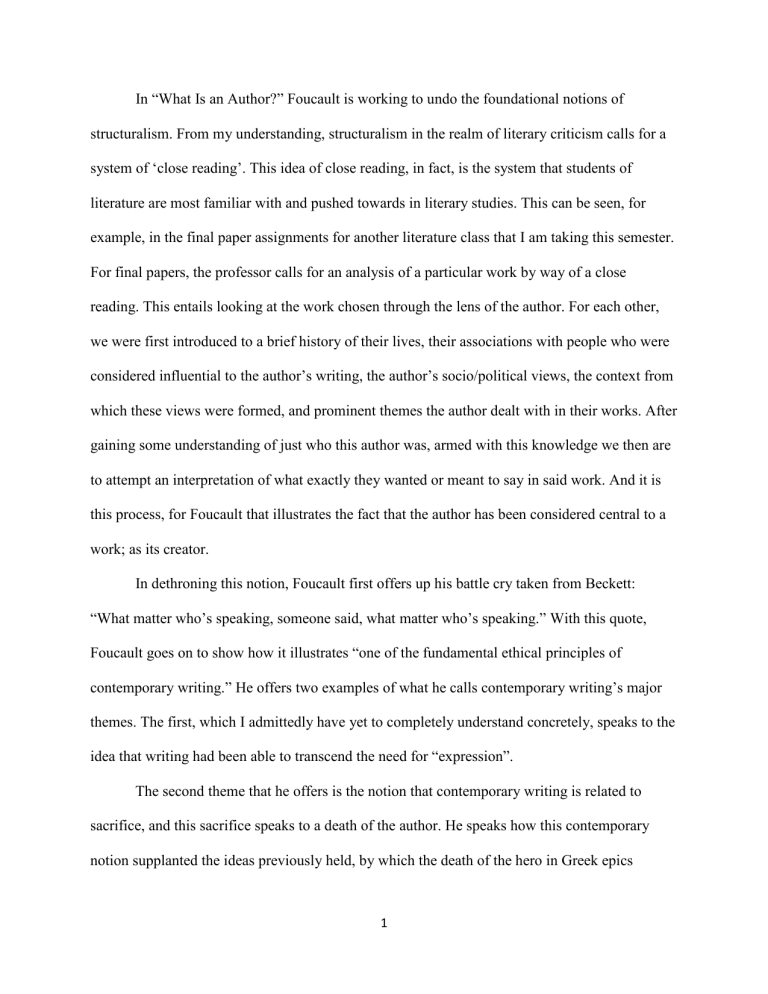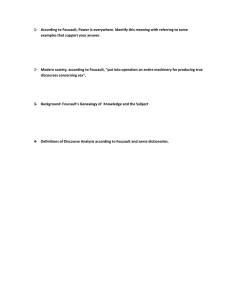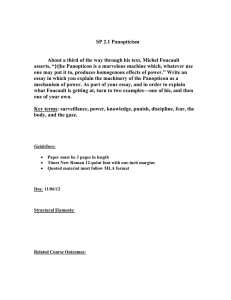
In “What Is an Author?” Foucault is working to undo the foundational notions of structuralism. From my understanding, structuralism in the realm of literary criticism calls for a system of ‘close reading’. This idea of close reading, in fact, is the system that students of literature are most familiar with and pushed towards in literary studies. This can be seen, for example, in the final paper assignments for another literature class that I am taking this semester. For final papers, the professor calls for an analysis of a particular work by way of a close reading. This entails looking at the work chosen through the lens of the author. For each other, we were first introduced to a brief history of their lives, their associations with people who were considered influential to the author’s writing, the author’s socio/political views, the context from which these views were formed, and prominent themes the author dealt with in their works. After gaining some understanding of just who this author was, armed with this knowledge we then are to attempt an interpretation of what exactly they wanted or meant to say in said work. And it is this process, for Foucault that illustrates the fact that the author has been considered central to a work; as its creator. In dethroning this notion, Foucault first offers up his battle cry taken from Beckett: “What matter who’s speaking, someone said, what matter who’s speaking.” With this quote, Foucault goes on to show how it illustrates “one of the fundamental ethical principles of contemporary writing.” He offers two examples of what he calls contemporary writing’s major themes. The first, which I admittedly have yet to completely understand concretely, speaks to the idea that writing had been able to transcend the need for “expression”. The second theme that he offers is the notion that contemporary writing is related to sacrifice, and this sacrifice speaks to a death of the author. He speaks how this contemporary notion supplanted the ideas previously held, by which the death of the hero in Greek epics 1 granted him immortality, or how “The Arabian Nights” presents storytellers attempting to extend their stories as long as possible so as to extend their lives. So, this death of the author, or the work killing the author, in much the same way as Nietzsche’s proclamation through Zarathustra that ‘God is dead’ calls for removing ‘author’ from its central position as the focus of interpretation and criticism. Taking the author from the center, the author becomes a function of the work. Foucault also addresses the new critics, when on page 1262 he speaks of the idea of approaching criticism of a work solely on the basis of its structure leaving out all relation to the author. To this notion, he points out that if we take ‘author’ off of the table, then what can we call a work. This leads to a slippery slope where everything written by a person may then be seen as a work. Basically, if there is no ‘author’, then there is no ‘work’. Next in line is the point that if there is an author, then what is to be considered a work. Does acknowledging someone as an author then necessitate reference to everything from their notes, grocery lists, etc. as ‘works?’ An author is a proper name and as such refers to a specific historical figure. However, ‘author’ also carries along with it a connotation which encompasses the ideas, the works, and the ‘known’ persona associated with said author. Using his terminology, ‘designation’ denotes the author as a person, while ‘description’ refers to the ideas, the works, etc. that become associated with the author’s name. He gives the example that if it was discovered that Shakespeare was not born in the house now believed to be his birthplace, it would not change the function of his name and the weight it brings to bear on his works. However, if it is discovered that he was not the author of a work once attributed to him or that he was in fact the author of something attributed to Bacon, the function of his name would undergo modification. 2 For Foucault, the proper name that is an author is a classification for a concept outside of the author. We use this set of classifications to distinguish one from another. Additionally, the fact that something has an author dictates that it is not meant to be overlooked, ignored, or forgotten. Yet, according to Foucault, that does not preclude something classified as a work from lacking the author function. He offers folk tales, epics, and tragedies as examples of types of works historically not dependent on the author function. This comes into play because the author function is not “universal or constant in all discourses.” The non-universality of the author function can also be illustrated with the fact that unlike in the modern era, when literary works need carry the author function, while with scientific literature, the author is not central in the evaluation of its content. Foucault states that this state of affairs arose in the 17th and 18th centuries. Prior to this time, the opposite was the norm, specifically, a piece of literature did not necessitate an author function, yet scientific literature did. He highlights this modern need for an author by pointing out that for literary works that for whatever reason are presented as written by an anonymous or unknown writer, every attempt is made to deduce the name of its author. Our predisposition for assigning authorship was passed down by way of the Christian tradition of recovering the author’s name for religious writings so as to bestow them with a higher level of holiness by association with their authors or reject them when the author proved not holy enough; a process termed exegesis. Foucault’s next point is that the author function, “is not formed spontaneously through the simple attribution of a discourse to an individual.” It is a result of the psychological projections of society onto what are deemed works. The manner in which society approaches authors can vary, as the accepted construct associated with ‘a philosopher’ do not correspond with that of ‘a poet.’ Though the constructs associated with varying types of writings differ, 3 Foucault says there are “transhistorical constants” which we bring to bear on the question of an author. To illustrate these constants, he approaches Saint Jerome as an author function. Saint Jerome wrote that homonymy could not be relied upon in the process of ascribing authorship to any particular individual, because multiple people may carry the same name or the deceitful more misappropriate another’s name in order to elevate the status of their own writings. As a set of countermeasures, Saint Jerome came up with four norms by which to examine and ascribe authorship: 1. Authors are to be evaluated and their works assessed on a standard level of quality, allowing works not meeting this standard to be ruled out as the works of said author; 2. Authors are assessed for the ideas they propound, allowing works that speak to the contrary to be eliminated; 3. The same process is performed on the basis of style; and 4. Works are eliminated which refer to historical events occurring outside of said author’s lifetime. Foucault states that Saint Jerome’s norms may seem inadequate, yet points out that they do possess similarities to modern “critical modalities.” Foucault goes on to state that we cannot simple think of the author function as something derived after the fact. For any work, there are elements of grammar that stand as signifiers of the author. Here he places emphasis on pronouns, especially the personal pronoun ‘I.’ He explains that “I” cannot be understood to always refer to any one entity in a work, such as the narrator, any certain character or the writer. This separation of egos within a text is not unique to fiction, as it also manifests itself in all forms of discourse. On this point, I find myself thinking of other signifiers. The first to come to mind is the formation, use, and syntactical structure of accents, dialects, pigeons, etc. As there is no standard application of these forms of speech in literature, one may be able to take a work perhaps found in some attic and present on one of those reality 4 television shows and determine by way of analysis of such structures whether it was written by John Steinbeck or Toni Morrison. Admitting the limited scope of his essay, Foucault points out that these principle also relate to painting, music, and technical fields. Here he introduced the “transdiscursive” position, which covers assigning authorship to forms other than books, such as theories, which, once put forth foster the proliferation of other books. Outside of those in the transdiscursive position, as well as those positions already covered, Foucault presents what he calls “initiators of discursive practices.” These figures stands as super author functions, in that, they are responsible not only for their own works but for blazing trails into new realms of discourse that then served as an arena for others to spring from. He stipulates that novelists are outside the scope of initiators of discursive practices. I immediately found myself offering vehement opposition to this statement in my head. However, he anticipate mine and others’ objections by clarifying the distinction between novelists and his initiators. Ann Radcliffe is offered up as an example of this distinction. While she is credited for the genesis of the Gothic Romance genre of literature, those she influenced merely play on a pattern represented by this genre. I look at it as a sort of cookie cutter model, whereby other authors are influenced by her work, yet the works they spawn fit neatly into the form she created. On the other hand, initiators, such as Marx, or Freud, initiated the formations of patterns outside of their own through which others were able to create new forms of discourse. 5


